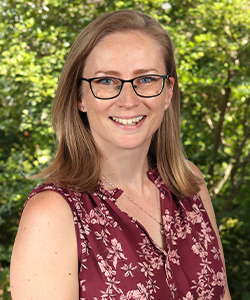
Meet Forest G. Rosenfeld
Assistant Professor, Psychology
Preferred Pronouns: she/her
Phone: (813) 257-4047
Email: lrosenfeld@ut.edu
Address: 401 W. Kennedy Blvd. Tampa, FL 33606
Mailbox: Q
Building:
PH
Room: 503
Education
2010 University of Florida, B.S.
2014 University of Florida, M.S.
2017 University of Florida, Ph.D.
Courses Taught
Fundamentals of Biopsychology and Learning
Statistics and Experimental Methods I
Behavioral Neuroscience
Career Specialties
Forest Rosenfeld specializes in experimental psychophysiology and behavioral and cognitive neuroscience in humans. Her primary focus is on threat learning, attention processes, emotion perception and how these mechanisms and their resulting phenomena relate to mental health disorders.
Professional and Community Activities
Rosenfeld studies human cognitive and behavioral neuroscience, using psychophysiological methods (EEG and autonomic measures of defensive reactivity). The overall goal of her research is to define how experience and learning shape brain and bodily systems, in adaptive and maladaptive ways. When things become uncertain and potentially threatening, various systems interact to predict what will happen next and to determine how we should act. Emotion, attention, perception and expectation are some of these systems or processes, and they can vary widely from person to person.
Rosenfeld's work aims to better understand these processes in healthy individuals, as well as utilize this knowledge to understand the underlying neurobiological mechanisms of anxiety, trauma, mood and OCD and tic disorders. Other areas of research that Rosenfeld has investigated are face processing, mindfulness and psycho-oncology. Her postdoctoral work at Vanderbilt University and the University of South Florida allowed her to expand into some of these other fields of research.
Some of her recent publications include the following:
Gruss, L. F., Lengacher, C. A., Reich, R. R., Moscoso, M. S., Gordillo-Casero, L., Joshi, A., Hamilton, L., Chauca, K. (under review). Mindfulness-based stress reduction for breast cancer survivors MBSR(BC) improves self-reported optimism.
Lengacher, C. A., Kip, K. E., Reich, R. R., Rodriguez, C., Meng, H., Donovan, K., Gruss, L. F., Nguyen, A. T., Moscoso, M. S., Goodman, M., Chauca, K., Joshi, A., Gordillo-Casero, L., Hamilton, L., Park, J. Y. (under review). Mindfulness-based stress reduction trial for cognitive impairment in breast cancer survivors: the design and an analysis plan of a 3-armed randomized controlled trial.
Gruss, L. F. (re-submission). Interactions of transient and oscillatory evoked potentials during visual search: revisiting the classical superposition theory with steady-state visual evoked potentials.
Rosenfeld, J. A., Kamalapurkar, R., Gruss, L. F., & Johnson, T. T. (2021). On the occupation kernels, Liouville operators, and dynamic mode decomposition. In 2021 American Control Conference (ACC), IEEE.
Lengacher, C. A., Gruss, L. F., Kip, K. E., Reich, R. R., Chauca, K. G., Moscoso, M., Joshi, A., Tinsley, S., Shani, P. B., Cousin, L., Khan, C. P., Goodman, M., & Park, J. Y. (2021). Mindfulness-based stress reduction for breast cancer survivors (MBSR(BC)): evaluating mediators of psychological and physical outcomes in a large randomized controlled trial. Journal of Behavioral Medicine, 44(5), 591-604.
Rosenfeld, J. A., Kamalapurkar, R., Gruss, L. F., & Johnson, T. T. (2021). Dynamic mode decomposition for continuous-time systems with the Liouville operator. Journal of Nonlinear Science, 32(1), 1-30.
Honors and Awards
E. Porter Horne Memorial Scholarship, UF, 2016
GSF Four-year Fellowship (Graduate School Fellowship), UF, 2012-2016
